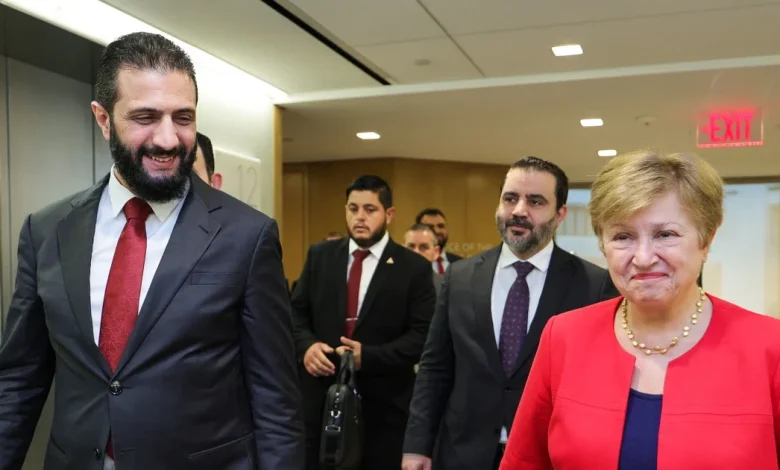Syrian President al-Sharaa meets with Trump at White House, a first for former jihadist

The Oval Office is a long way from Abu Ghraib.
When he’s greeted by President Donald Trump on Monday, Ahmad al-Sharaa will have completed his journey from jihadist leader to head of state receiving a warm White House welcome.
Since toppling the regime of President Bashar al-Assad, Syria‘s interim leader has spent the past year transforming his global image while tackling deep divisions at home.
Now, al-Sharaa, who has thrown off his nom de guerre Abu Mohammad al-Jolani, will make history as the first Syrian president to visit the White House.
“I think he’s doing a very good job,” Trump said last week, setting the tone for his landmark meeting with al-Sharaa, who would not have been able to set foot in the U.S. a year ago thanks to the $10 million bounty on his head. “It’s a tough neighborhood and he’s a tough guy, but I got along with him very well and a lot of progress has been made with Syria,” Trump said.
During his Washington visit, Al-Sharaa is expected to commit to joining the U.S.-led coalition to defeat ISIS, two U.S. officials told NBC News. It would be a significant step in his country’s engagement with the West.
The State Department removed al-Sharaa and his interior minister from the Specially Designated Global Terrorist list on Friday, while the U.K. and Europe removed sanctions on al-Sharaa after the United Nations Security Council voted in favor of a U.S.-drafted resolution to do so.
The Washington trip is “a high-level sign of the trust that the American administration has placed in al-Sharaa — and the hope that he will succeed in holding Syria together during this incredibly complicated transition period,” said Burcu Ozcelik, a senior research fellow at the Royal United Services Institute, a London-based think tank.
A ‘turning point’
Al-Sharaa rose to power after leading Hayat Tahrir al-Sham, or HTS, in toppling Assad’s regime last December.
Since then, he has sought to distance himself from his past as a jihadist who had been jailed by U.S. forces in Iraq, trading military fatigues for smart suits and vowing to rebuild Syria and unify its myriad religious and ethnic groups.
Trump’s approach, a dramatic shift for the U.S., has underscored al-Sharaa’s success in breaking the country’s decadeslong global isolation.
The U.S. removed its terrorist designation for HTS, along with the bounty on al-Sharaa himself, before lifting a string of sanctions following a May meeting between the Syrian leader and Trump in Saudi Arabia.
President Donald Trump and Syrian President Ahmed al-Sharaa.@PressSec / via X
Al-Sharaa was in New York in September to address the United Nations General Assembly, but Syria’s Ministry of Information said that being welcomed to the White House marked a “major turning point” for the country.
At home, however, al-Sharaa has struggled to unify a deeply divided Syria while grappling with broader threats: a resurgent ISIS, fraught relations with increasingly assertive neighbor Israel, and Russia’s determination to maintain its strategic foothold in Syria while giving safe haven to Assad.
Syria has experienced flashes of violence, including deadly attacks against minority groups allegedly carried out in part by government forces. Growing tensions with Kurdish authorities in northeast Syria have also erupted into violent clashes.
“He’s certainly being (very) smart,” John Jenkins, a former British diplomat who has previously served as head of mission in Syria, said of al-Sharaa in emailed comments.
“A trip to D.C. makes him look respectable,” said Jenkins, an associate fellow at Chatham House and a leader at Cambridge University’s Centre for Geopolitics. But, he added,”the key issues are domestic.”
And within Syria, opinions have been deeply divided.
“He does not represent the Syrian people,” said Sami Zain Al-Din, a 72-year-old political activist from Sweida, a southern city that was rocked by deadly clashes involving the Druze community, which has close ties to Israel.
For doctor Jalnar Hamad, doubts over al-Sharaa were balanced against hopes that his meeting with Trump could open a “new chapter” that could see Sweida “benefit from development or reconstruction programs,” she said.
Syria’s President Ahmed al-Sharaa with representatives of Syrian-American organizations in Washington D.C. on Sunday.AFP via Getty Images
Ilham Ahmed, co-chair of the Syrian Democratic Council, the political arm of the Kurdish-led and U.S.-backed Syrian Democratic Forces, said the Trump meeting was “an opportunity to redefine the position of the new Syrian state.”
It’s also a chance for Trump to address “the rights of the Kurdish people and the coalition partners who fought terrorism on behalf of the world,” he said, referring to the SDF’s role against ISIS.
Further sanctions lifted?
Al-Sharaa will be hoping to emerge strengthened domestically, and key to that effort is his bid to remove remaining sanctions imposed on Syria during Assad’s rule.
Already, “the pace with which sanctions have been eased on Syria since May has been absolutely spectacular,” Karam Shaar, a consultant on Syria and the research director at the Operations and Policy Center think tank in Turkey, said in a voice note.
Shaar said he expected that two “main pieces of sanctions will have been either lifted or just about to be lifted” by the time al-Sharaa and Trump meet, including the removal of Syria from America’s list of “state sponsors of terrorism” and the repeal of sanctions under the Caesar Act, a 2019 law targeting the Assad regime.
But sanctions will not be the only focus, with the effort to quell ISIS’ resurgence and relations with Israel also expected to play a central role.
The U.S. ally has faced growing isolation on the global stage over its deadly assault in Gaza, but Trump has previously expressed hopes Syria would join other Arab nations in normalizing ties with Israel under the Abraham Accords, which were expanded again last week.
It remains unclear whether Trump will push the matter during talks with al-Sharaa on Monday.
Syria, historically a staunch ally of Iran, has never recognized Israel and has been locked in a state of conflict with the country since its establishment in 1948. Iranian proxy Hezbollah has also long been deeply embedded in Syria after joining the Assad regime’s military efforts.
When Assad was in power, Israel routinely carried out airstrikes against what it said were Iranian-linked targets inside Syria, and since his ouster, it has deployed troops to a United Nations-patrolled buffer zone and has repeatedly launched airstrikes and incursions into Syria.
Damascus has so far refused to retaliate, while both countries have kept the lines of communication open.





